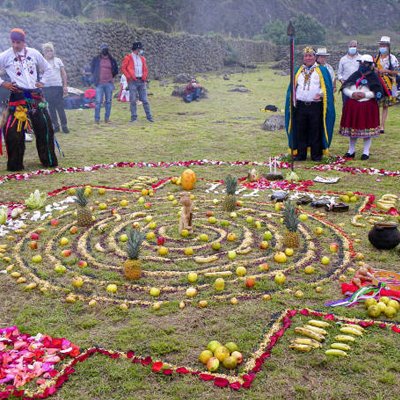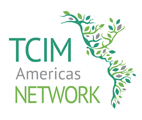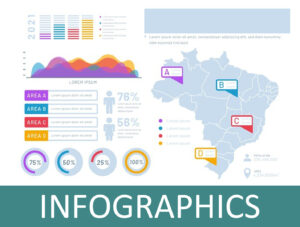Traditional Medicines of the Americas

The Region of the Americas is characterized by a great diversity of cultures. There are as many cultures as there are cultural manifestations and ways of understanding, caring for, and protecting health and preventing disease.
The PAHO/WHO Policy on Ethnicity and Health describes these cultures as a collectivity that identifies itself and is identified by others on the basis of certain common elements, such as language, religion, tribe, nationality or race, or a combination of these elements, and that shares a common sense of identity […]. This definition includes, among other ethnic groups, indigenous peoples, Afro-descendant peoples and Roma (the terms used vary according to the way in which these populations are recognized and organized in each country).
These populations have ancestrally structured their own ways of maintaining harmony, preventing imbalances and restoring health to achieve well-being. These are known as traditional medicines, or ‘traditional ancestral medicines’, ‘ancestral medicines’ or ‘indigenous medicines’, depending on the name and context of each country and population. They encompass the complex, systemic and integral body of knowledge, wisdom and ancient practices that have been historically transmitted from one generation to the next within their cultures and systems of life. This vision of health embraces the interaction and inseparability of Mother Nature, territory, communities, families and individuals. Likewise, this perspective establishes a close relationship with the territory as the source of spiritual, mental and material life, where their culture, collectivity, ancestry and autonomy survive.
In recognition of the cultural and health diversity of the Region, WHO, together with its Regional Organization for the Americas, the Pan American Health Organization (PAHO), and in coordination with other international organizations such as the Andean Health Organization (ORASCONHU), has issued recommendations and calls to the countries of the Americas to adopt public policies that address the specific health needs of their peoples, to protect and strengthen traditional medicines, and to incorporate an intercultural approach into their health policies, plans and programs.
In parallel, indigenous populations, Afro-descendants, Roma and other ethnic peoples have advanced processes of vindication of their rights, in this case the right to health from an integral and intercultural perspective that articulates not only the institutional medical services for disease care, but also the action on the different environmental, socioeconomic and cultural factors that influence health; as well as the recognition and valuation of the right to health.
In this context, the countries of the Region of the Americas have begun to make visible in their constitutions and local jurisprudence not only the existence and survival of traditional medicines, but also their recognition as traditional medical systems, together with their knowledge, know-how, practices and practitioners. They have also recognised the right of these populations to participate in the design, implementation, monitoring, and evaluation of policies, plans, programs, and projects that allow for the articulation between traditional medicine and allopathic – Western – medicine, the incorporation of traditional medicine into health services, and the provision of culturally appropriate health services.
They have also promoted the elaboration of technical guidelines, manuals, protocols, norms and regulations, as well as actions for the recognition, protection and strengthening of traditional medicines, both from the institutional framework and from the populations themselves. In addition, they have promoted the design and implementation of their own intercultural health models; sociocultural adaptations in institutional health systems; analysis of the health-disease situation from the perspective of cultural diversity and the elaboration of sociocultural epidemiological profiles; systematization and analysis of information on the knowledge, know-how and good practices of traditional medicines; awareness-raising, education and training of their own and institutional human talent in health; articulation and coordination with other sectors that have an impact on health – intersectorality – within the framework of the social determinants of health; among other aspects.
The Ethnicity and Health Policy has 5 priority areas:
- Generating evidence,
- Promoting policy action,
- Social participation and strategic alliances
- Recognition of ancestral knowledge and traditional and complementary medicine, and
- Capacity building at all levels.
The TCIM Americas Network presents this section within the framework of national and community developments and as a tool for implementing the priority areas of the Policy on Ethnicity and Health. This section contains information related not only to the aforementioned activities undertaken in the countries to ensure that these medicines are integrated and complementary in the health systems of the respective countries, and that they are recognized, recovered, protected and revitalized, but also to:
- The conception and description of traditional medicines, their knowledge and traditional health knowledge, developed over thousands of years,
- traditional health models, specialties and their professionals
- traditional midwifery, the use of medicinal plants, the human, physical and technical resources used, as well as traditional resources, products
- as well as traditional resources, products and spaces for the treatment of diseases.
This section also includes information on:
- The cultural and ethnic diversity of the Region
- International regulations governing the recognition, evaluation, promotion, use, regulation and protection of traditional medicines and intercultural health policies, including their strategies and action plans;
- Information related to the dialogue on health knowledge and know-how, the exchange of experiences and good practices, and the contribution of traditional medicines in emergency and disaster situations (as in the case of COVID19).
It will also have access to various documentation centers, academic institutions, research groups, collaborative networks, associations and international organizations that contain elements related to traditional medicines.
All of this is in accordance with the Universal System of Human Rights, International Humanitarian Law and intercultural health policies such as the “Policy on Ethnicity and Health” (PAHO/WHO) and the “Andean Intercultural Health Policy” (ORAS-CONHU).
This section is a space of permanent collective construction, where the intercultural health knowledge and know-how of indigenous, Afro-descendant, Roma and other ethnic peoples of the Region of the Americas, and all the cross-cutting elements necessary for a complete understanding of the health reality of these populations, as well as the contributions of traditional medicines to current health systems and models, will be included to the extent that they authorize it.
The knowledge and practices of the traditional medicines of the indigenous, Afro-descendant, Roma and other ethnic peoples of the Americas are part of the legacy and intangible heritage of humanity and are permeated by social, political, cultural and historical issues in each country, as well as by their own realities and worldviews; therefore, they require a respectful, responsible and comprehensive view.
https://mtci.bvsalud.org/vitrinas/en/post_vitrines/traditional-medicines-of-the-americas/
https://bvsalud.org/vitrinas/en/post_vitrines/ethnicity-and-health/





